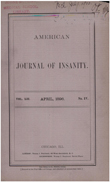Dissociation in aging Holocaust survivors
Abstract
OBJECTIVE: This study explored relationships among dissociation, trauma, and posttraumatic stress disorder (PTSD) in elderly Holocaust survivors with and without PTSD and in a demographically comparable group of nontraumatized subjects. METHOD: Holocaust survivors with PTSD (N = 35) and without PTSD (N = 25) who had been recruited from the community and a comparison group (N = 16) were studied. Dissociation was evaluated with the Dissociative Experiences Scale. Past cumulative trauma and recent stress were evaluated with the Antonovsky Life Crises Scale and the Elderly Care Research Center Recent Life Events Scale, respectively. PTSD symptoms were assessed with the Clinician- Administered PTSD Scale. RESULTS: The Holocaust survivors with PTSD showed significantly higher levels of current dissociative experiences than did the other groups. However, the extent of dissociation was substantially less than that which has been observed in other trauma survivors with PTSD. Dissociative Experiences Scale scores were significantly associated with PTSD symptom severity, but the relation between Dissociative Experiences Scale scores and exposure to trauma was not significant. CONCLUSIONS: Possible explanations for this finding include the age of the survivors, the length of time since the traumatic event, and possible unique features of the Holocaust survivor population. Nevertheless, the findings call into question the current notion that PTSD and dissociative experiences represent the same phenomenon. The findings suggest that the relationships among dissociation, trauma, and PTSD can be further clarified by longitudinal studies of trauma survivors.
Access content
To read the fulltext, please use one of the options below to sign in or purchase access.- Personal login
- Institutional Login
- Sign in via OpenAthens
- Register for access
-
Please login/register if you wish to pair your device and check access availability.
Not a subscriber?
PsychiatryOnline subscription options offer access to the DSM-5 library, books, journals, CME, and patient resources. This all-in-one virtual library provides psychiatrists and mental health professionals with key resources for diagnosis, treatment, research, and professional development.
Need more help? PsychiatryOnline Customer Service may be reached by emailing [email protected] or by calling 800-368-5777 (in the U.S.) or 703-907-7322 (outside the U.S.).



